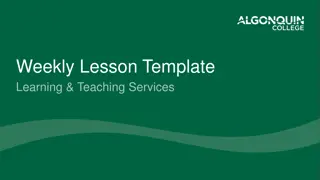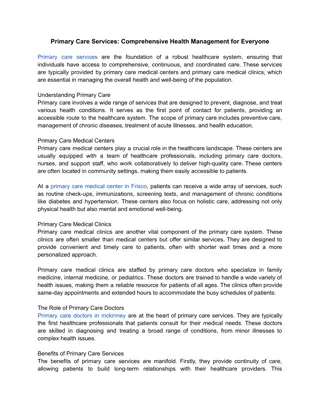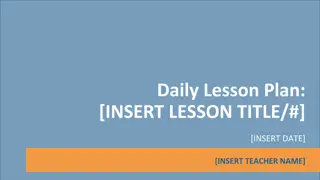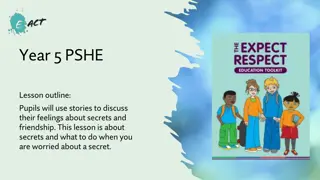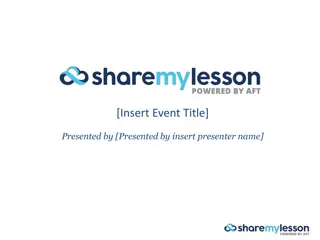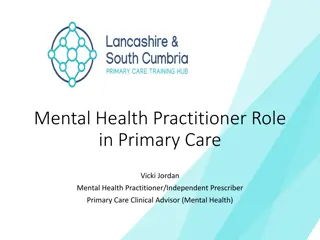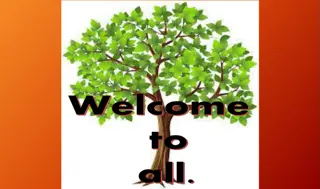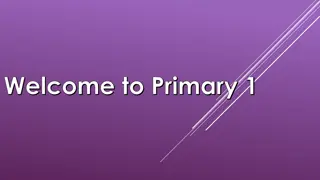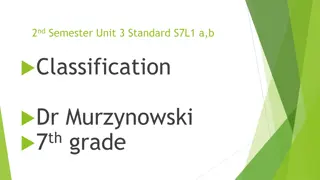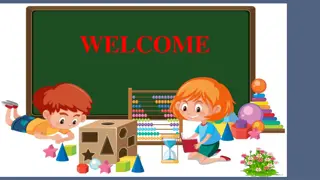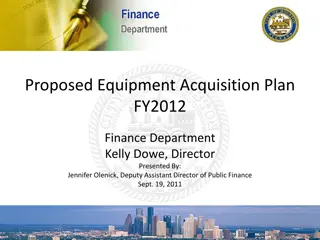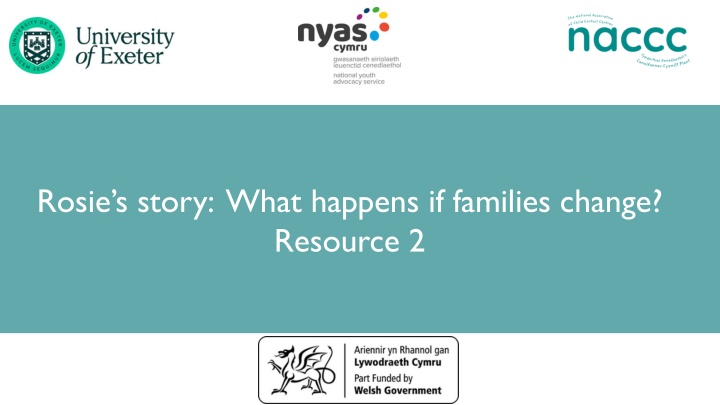
Children's Rights and Emotions in Changing Families
Explore resources and guidance for teaching children about their rights and emotions in the context of changing families. Delve into the UNCRC and learn how to support children through parental separation, all while normalizing their emotions. Prepare for a 45-minute learning session with engaging activities and slides.
Download Presentation

Please find below an Image/Link to download the presentation.
The content on the website is provided AS IS for your information and personal use only. It may not be sold, licensed, or shared on other websites without obtaining consent from the author. If you encounter any issues during the download, it is possible that the publisher has removed the file from their server.
You are allowed to download the files provided on this website for personal or commercial use, subject to the condition that they are used lawfully. All files are the property of their respective owners.
The content on the website is provided AS IS for your information and personal use only. It may not be sold, licensed, or shared on other websites without obtaining consent from the author.
E N D
Presentation Transcript
TEACHER SLIDE PREPARING TO TEACH Preparing to teach and using these slides The slides headed teacher slides assist the teacher in setting up and running the learning. Slide 10 onwards are for learner-facing learning. Please read the Teacher Guidance (Resource 2) for Rosie's Story before teaching. Have slides in presenter mode notes are available under each slide to aid teaching Support and extension: activities are suggested where appropriate (icons on bottom right corner of slides). Resources Sticky notes. An ask-it-basket /question box for learners to ask questions confidentially. Handout for quick fire quiz if using. Save for the above, no additional teaching resources are needed to teach this learning session. Timing The learning will take place over 45 minutes.
TEACHER SLIDE: STATEMENTS OF WHAT MATTERS In Resource 1 and 2, discussing when parents and carers separate and normalising the range of emotions that children and young people may go through when parents and carers separate covers a number of statements of what matters . For example, from Health and Well-being: How we process and respond to our experiences affects our mental health and emotional well-being. Healthy relationships are fundamental to our well-being. In Resource 2, children and young people learning about their right to express their opinions under the UNCRC, Article 12 when decisions are being made following the separation of their parents and carers covers a number of 'statements of what matters' such as this one from Humanities: Informed, self-aware citizens engage with the challenges and opportunities that face humanity, and are able to take considered and ethical action.
TEACHER SLIDE PROGRESSION STEPS Resource 1, discusses parental separation and normalises emotions that children and young people may go through. Resource 2 discusses sources of support for children and young people on parental separation. Both resources will help learners understand key areas outlined in Progression steps 2 and 3. For example, from Health and Well-being: How we process and respond to our experiences affects our mental health and emotional well- being. Healthy relationships are fundamental to our well- being. In Resource 2, children and young people learn about their right to express their voice and be heard when decisions are being made following the separation of their parents and carers. Learners will increase their understanding in Progression steps 2 and 3 such as this one from Humanities: Informed, self-aware citizens engage with the challenges and opportunities that face humanity, and are able to take considered and ethical action.
TEACHER SLIDE THE UNCRC The United Nations Convention on the Rights of the Child 1989 (UNCRC) is the global gold standard for children s rights and sets out the fundamental rights of all children. It is the most widely and rapidly ratified human rights treaty in history and sets out the civil, political, economic and cultural rights of every child. Countries that have ratified the UNCRC agree to safeguard the rights and ensure that adults and children know about them. The Convention: has been signed by 196 countries of which all but the USA have ratified it. (It was ratified in the UK in 1991.) has 4 guiding principles (non-discrimination; the best interests of the child; the right to life, survival and development; and the right of children to express their views freely and to be heard) which apply to all under 18s. consists of 54 Articles which include protecting children s rights to life; healthcare; education; protection from discrimination,harm or exploitation (including violence, abuse, neglect,kidnapping, child labour and child soldiers) and to live with their family (where possible).
TEACHER SLIDE CHILDREN AND YOUNG PEOPLE S ART. 12 RIGHTS The United Nations Convention on the Rights of the Child 1989 (UNCRC) Article 12 gives all children the right to have their voices heard and their opinions listened to and taken seriously by adults. This includes the right to information, consultation and representation (if needed) when their parents and carers separate. These rights are universal and freestanding. In a minority of cases, it may be appropriate for the child to make their own application to the family court. Legal aid (i.e. funding) is available for this and a solicitor or an advocate from The National Youth Advocacy Service, Cymru (NYAS, Cymru see slide 24) can make the application for the child and represent them in the family court if needed. Children are also entitled to speak to the mediator if their parents and carers are in mediation. This process is known as child inclusive mediation .
TEACHER SLIDE ARTICLE 12 RIGHTS (CONT.) Article 12 rights do not mean that children and young people make the decisions the responsible adults (usually their parents) do, but children and young people have the right to have their opinions listened to. The weight placed upon those opinions will depend upon the age and maturity of the child. The parents of approximately 280,000 children and young people separate each year. There were approximately 87,000 dependent children living in lone parent households in Wales in 2021. Evidence from the Millennium Cohort Study indicates that 39% of children were not living in the same household as both parents by the age of 11. Research indicates that children cope better when they are consulted about arrangements for them when parents separate and arrangements made are longer-lasting, yet they are seldom consulted.
TEACHER SLIDE THE DIVORCE LEGISLATION The Matrimonial Causes Act 1973 ( the old law ) was in force until 6 April 2022. It provided that divorce could be granted on the ground of irretrievable breakdown, proved by one of five facts; the Respondent has committed adultery (had sex with a member of the opposite sex whom they are not married to) the Respondent has behaved unreasonably the Respondent has deserted the Petitioner for a period of 2 years the parties have been separated for two years (provided the other party agreed) the parties have been separated for five years (agreement of the other party not required The Respondent could defend a fault based application, but that rarely happened as it was costly. The law was widely criticised as the requirement to blame the other person could increase animosity. The Divorce, Dissolution and Separation Act 2020, ( the new law ) was introduced in April 2022. It removes fault from the process. The ground for divorce remains the same the marriage must have irretrievably broken down but this is proved by the passage of time. The Applicant can apply for a final order 26 weeks after filing the application. There is no option to defend the divorce and the application can be made jointly. For some, it will increase the length of time it takes to get a divorce because the so called quickie facts of adultery or unreasonable behaviour no longer apply.
TEACHER SLIDE LEARNING AND SUGGESTED TIMING Activity Description Suggested timing 5 minutes 7 minutes Introduction Baseline activity Ground rules, learning objective and outcomes. Learners will draw a mind map of what questions Rosie may have had and her support needs when her parents first separated. Learners will be introduced to The United Nations, the UNCRC, and will complete the gap-fill exercise to recap on Article 12. In pairs, learners will be asked to write down the people that Rosie has at home or at school who she could talk to if she is feeling upset. Learners will learn about the process of divorce and for making child arrangements, and how their voices are included then consolidate with a quiz. Learners will learn about the support, online and in the community, available to children and young people whose parents and carers separate. Learners will revisit and revise the baseline answers as appropriate and review the further help and support available. Introduction to the UNCRC Who can Rosie speak to for support? Processes and quick- fire quiz Sources of support 5 minutes 3 minutes 15 minutes 5 minutes Endpoint assessment 5 minutes
GROUND RULES We will: be kind and compassionate towards each other talk about someone I know rather than using a person s name have the right not to answer comment on what is said, not who has said it seek help in school/encourage friends to seek help if needed. We will not: give information about our family s story tell anyone else about other people s story judge others put anyone on the spot ask personal questions or try to embarrass someone.
ROSIES STORY: WHAT HAPPENS IF FAMILIES CHANGE? RESOURCE 2 LEARNING OBJECTIVE Learning objective Learners will learn: about rights children and young people have if parents and carers separate and the type of support they might need.
ROSIES STORY: WHAT HAPPENS IF FAMILIES CHANGE? RESOURCE 2 LEARNING OUTCOMES Learning outcomes - Learners will be able to: explain children and young people s rights under Article 12, UNCRC when parents and carers separate identify the different ways arrangements for children and young people can be made and how children and young people can be consulted if parents and carers separate identify sources of support for these children and young people and explain how to access them.
BASELINE ACTIVITY SUPPORT FOR CHILDREN Draw a circle with the word Rosie in the middle. Around the outside, write down: questions you think Rosie may have had when her mum and dad first separated support you think Rosie may have needed and examples of support you know of that may be available to her.
INTRODUCTION TO THE UNCRC The Convention The United Nations Convention on the Rights of the Child 1989 (UNCRC) is an important agreement by countries who have promised to protect children s rights. The UNCRC explains the rights children have and how governments must make sure that the rights are upheld. Article 12 of the UNCRC gives children the right to give their opinions on matters affecting them and adults must take those opinions seriously.
ARTICLE 12: UNCRC ARTICLE 12 You have the _________ to give your ___________ and for __________ to _________, and take it __________. adults, opinion, seriously, right, listen
WHO CAN ROSIE SPEAK TO FOR SUPPORT? Rosie s friend, Billy Rosie s teacher, Mr Green Rosie
WHAT IS THE PROCESS WHEN PARENTS AND CARERS SEPARATE? If a couple aren't married, they don't need to apply to the family court to end their relationship. If a couple are married, they need to apply to the family court for a divorce to end their relationship but there is no need for anyone to attend the court in person. The person applying for the divorce is the Applicant. The other person is the Respondent. From April 2022, The Divorce, Dissolution and Separation Act 2020 has been in force. Since then: The Applicant does not need to show that it was the Respondent s fault. The Respondent cannot say to the family court that they object to the divorce.
ROSIES STORY Rosie is aged 9. She lives with her mum, her brother Jack, aged 13, her sister Chloe aged 15 and their dog Max. Explain that when Rosie's parents separated a year ago it had been hard for Rosie and her brother and sister at first.Their dad introduced his new girlfriend quite quickly which upset and confused Rosie, so she had been reluctant to see him.Rosie s mum and dad agreed that Rosie would see her dad at a contact centre until things settled down.Because Rosie s parents couldn t agree the arrangements for when the children should spend time with each parent, Rosie s dad applied to the family court for a court order and now all three children see their dad together, staying over with him, his new partner, Min and Min s son Jonny. Rosie is feeling better about the situation now.
HOW ARE CHILD ARRANGEMENTS AGREED? Making child arrangements Most parents and carers agree arrangements between themselves the family court encourages this where it is safe to do so. Sometimes children attend a contact centre, a safe and friendly place for children to spend time with the parent they don't live with. Usually this is just for a short time then children move to spending time with that parent away from the contact centre.
MEDIATION Mediation If parents and carers can't agree between themselves, they can choose to meet with a mediator to help them to reach agreement instead of going to the family court. A mediator is someone who helps parents and carers who have separated to agree the things that need to be sorted out. The mediator doesn't take sides.
MEETING THE MEDIATOR Child inclusive mediation If children meet the mediator this is known as child inclusive mediation . Mediators meet with children who are around 9 or older. Child inclusive mediation gives children and young people the opportunity to meet and talk (alone or with their brothers and sisters) with the mediator who is helping their parents and carers to sort things out. The mediator then tells the parents and carers what the young person wants the mediator to say to help the parents and carers make decisions.
MEETING THE FAMILY COURT ADVISOR The Family Court Advisor (FCA) Sometimes the family court may ask an FCA to meet with a child or young person to talk about their wishes and feelings and to make sure the family court hears what they have to say. The FCA will also usually meet the parents and carers and will then gives their view to the family court about what is best for the child. FCAs do not need to meet all children and young people because sometimes families can agree themselves on what is best.
DECISIONS MADE AT THE FAMILY COURT Decisions made at the family court If parents and carers cannot agree, some will go to the family court where a person known as a judge will make a decision about what is best for the children. The judge, the parents and carers and any lawyers representing the parents and carers will read the recommendations of the FCA and usually agree child arrangements on this basis. Most parents and carers agree, but if they can t then the judge will decide. The children will not go to the family court unless they decide they want to see the judge.
QUICK-FIRE QUIZ 1. crucial 2. UNHEALTHY: All relationships go through ups and downs 3. HEALTHY: Respectfully dealing with issues as they arise keeps relationships on track 3. A mediator. 4. A Family Court Adviser (FCA). 5. No, the FCA tells the family court the views of the children, although the child can ask to speak to the judge if they want to. 6. Yes, if the court agrees, in rare cases they can apply and be represented separately. UNHEALTHY: Attraction is important but friendship is 1. No, from April 2022 you don t need to blame the other person to get a divorce. 2. A contact centre. 1. After April 2022, do couples have to say whose fault it was to get a divorce? Where did Rosie see her dad at first? What is the name of the person who helps parents and carers to reach an agreement without going to the family court? 2. 3. 1. Relationship built mostly on FRIENDSHIP 2. BOTH PARTNERS SHOULD EXPECT IT TO BE PERFECT IF IT S NOT MOVE ON 3. CONFLICT DEALT WITH AT AN EARLY STAGE 4. What is the name of the person who drafts reports for the family court? Do children have to go to the family court if their parents and carers apply to the family court? Can children make their own application to the family court? 4. 5. 6.
ENDPOINT ASSESSMENT ACTIVITY Return to the mind map you drew earlier and in a different colour add to your mind map by writing down: any words for how you think Rosie might have felt once she learned she had the rights to express her opinion and for this to be taken seriously. where Rosie could find information and support to help her now and in the future (give examples of organisations).
FURTHER HELP AND SUPPORT IN SCHOOL For further help and support in school contact: your teacher/teaching assistant senior staff in the school
FURTHER HELP AND SUPPORT - OUT OF SCHOOL For further help and support outside of school contact: National Youth Advocacy Service, Cymru: https://www.nyas.net/nyas-cymru/ (Tel: 0808 8081001) National Association of Child Contact Centres: https://naccc.org.uk (Tel: 01159 484557) Children s Commissioner for Wales: https://www.childcomwales.org.uk (Tel: 0808 801 1000) Cafcass Cymru: https://gov.wales/cafcass-cymru/family-separation (Tel: 0300 456 4000) Childline Cymru: https://www.childline.org.uk/info-advice/home-families/family- relationships/divorce-separation/ or for Welsh language version: https://www.childline.org.uk/get-support/contacting-childline/contacting-childline-in- welsh/ (Tel: 0800 1111) Relate Cymru: https://www.relate.org.uk/cymru/children-and-young-peoples-counselling (Tel: 03000030396) The Exchange: https://www.exchange-counselling.com/primary/ (Tel: 0330 2020283)



